Key takeaways:
- Understanding personal dieting needs involves listening to your body’s reactions and being flexible in your approach to food and meals.
- Establishing realistic, specific, and achievable goals helps maintain motivation and allows for adjustments based on changing life circumstances.
- Regularly tracking progress and reviewing dietary approaches can lead to significant improvements in motivation, energy levels, and overall well-being.
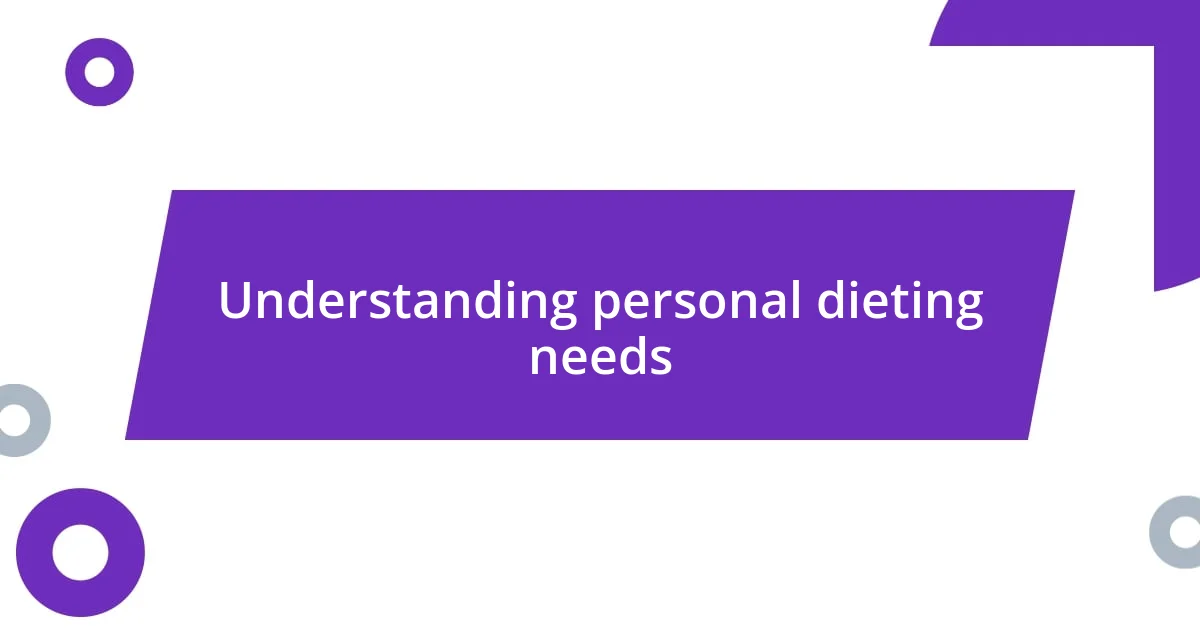
Understanding personal dieting needs
Understanding your personal dieting needs is like embarking on a journey tailored just for you. For instance, when I started paying attention to my body’s reactions to different foods, I noticed that my energy soared with a plant-based diet but dipped when I relied heavily on processed foods. Have you ever considered how your body responds differently to what you eat?
It’s fascinating how individual preferences and lifestyle can shape our dieting needs. I remember when I tried following a popular diet plan that everyone was raving about, only to find it left me feeling deprived and cranky. What I learned is that embracing my love for cooking and experimenting with recipes made a world of difference. Have you found a meal prep strategy that brings you joy?
Reflecting on my journey led me to recognize the importance of flexibility in dieting. I recall those moments when strict rules made me anxious, reminding me that life’s too short to avoid a slice of cake at a celebration. How can we find balance between enjoying our favorite foods and maintaining healthy habits? It’s all about discovering what works for you, stress-free.
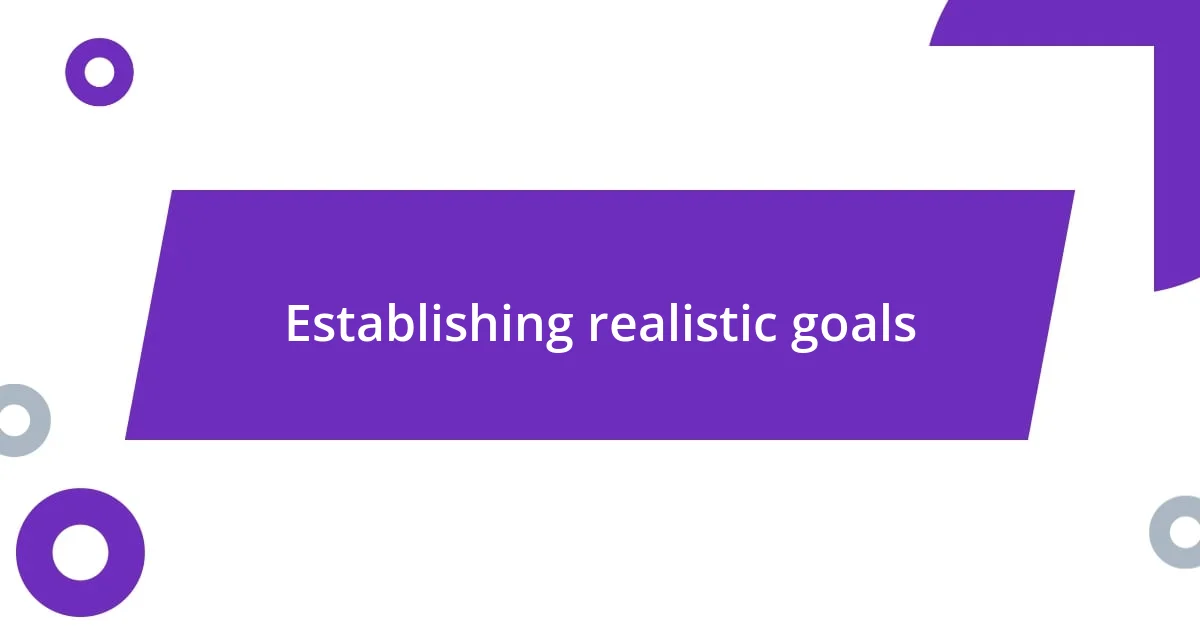
Establishing realistic goals
Establishing realistic goals is crucial for long-term success in dieting. I remember my initial approach to weight loss involved setting lofty targets that felt more like a chore than a challenge. After stumbling through disappointment, I discovered that setting smaller, achievable goals not only kept me motivated but also provided me with a sense of accomplishment along the way.
When I shifted my focus to specific and time-bound goals—like aiming to lose half a pound a week—things started to click. This change made my progress feel tangible, and I celebrated each small victory. Have you ever experienced the satisfaction of achieving a goal you previously thought was out of reach?
I’ve learned that it’s important to reflect regularly on these goals, adjusting them as needed. Sometimes, life throws unexpected challenges our way, and what once seemed realistic may change. For instance, when a work project demanded more time, I recognized that setting a temporary goal of maintaining my weight was perfectly fine. How do you adapt your goals when life gets busy? Flexibility is key to keeping the dieting journey enjoyable and sustainable.
| Goal Setting Aspect | Importance |
|---|---|
| Specificity | Ensures clarity and direction. |
| Achievability | Prevents feelings of overwhelm; boosts motivation. |
| Time-Bound | Creates a sense of urgency and helps track progress. |
| Flexibility | Adapts goals according to changing life circumstances. |
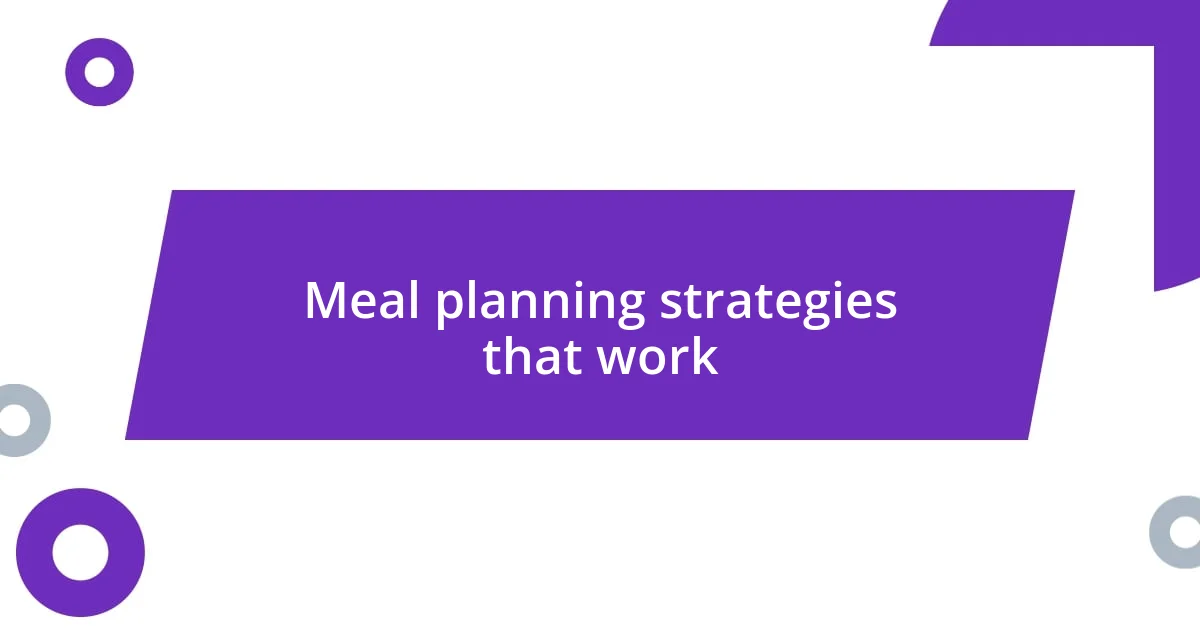
Meal planning strategies that work
Meal planning can be both a delicious and strategic exercise. When I started meal prepping, I was amazed by how organizing my week ahead transformed my eating habits. I used to find myself reaching for whatever was available in the fridge, which often led to unhealthy choices. By sat down on Sundays, I prioritized nutritious options I genuinely enjoyed, and this small change had a big impact on my week.
Here are some meal planning strategies that have made a difference for me:
- Variety is key: I always mix up my proteins, grains, and veggies to keep meals exciting.
- Batch cooking: Preparing larger quantities of certain dishes saves time and ensures I have healthy meals on hand.
- Theme nights: Assigning specific themes to nights, like “Meatless Monday” or “Taco Tuesday,” adds fun and structure.
- Incorporate leftovers: I’ve learned to embrace leftovers creatively, turning them into entirely new dishes.
- Snack preparation: I set aside time to portion out healthy snacks, making them easy to grab on busy days.
Planning my meals not only saved me time but helped me develop a rhythm in my eating habits that felt satisfying. For instance, I remember one week when I prepped a kale salad with an avocado dressing, and it became my go-to lunch. I genuinely looked forward to enjoying it each day instead of feeling burdened by what to eat last minute. Have you experienced that joy of having your meals ready and waiting?
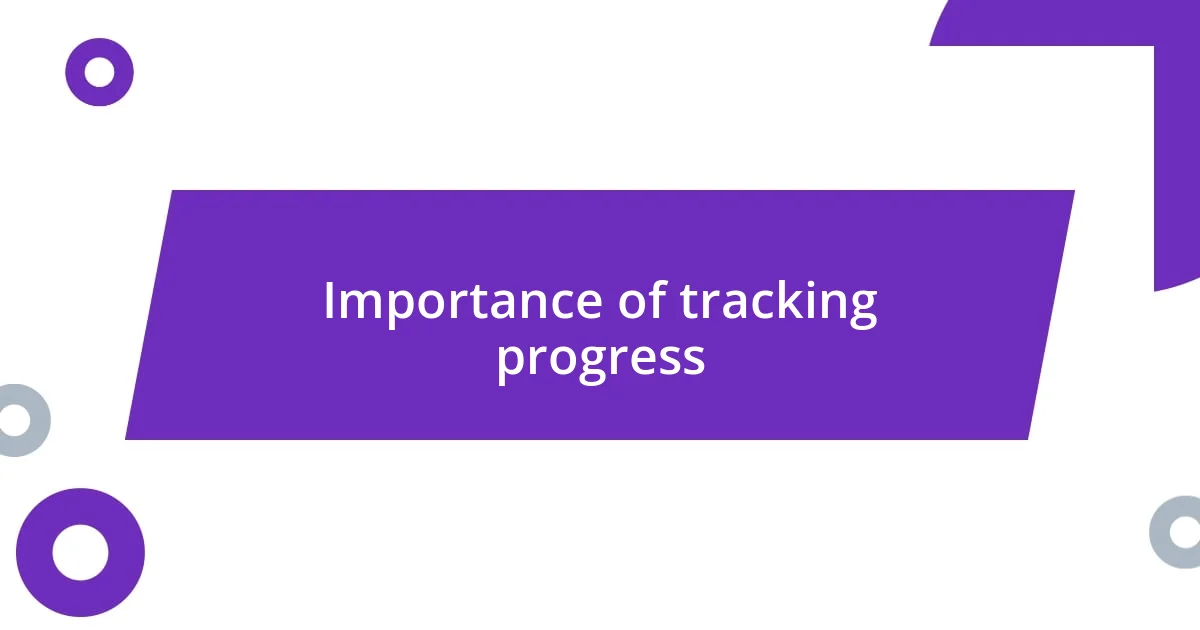
Importance of tracking progress
Tracking progress is a game changer in any dieting journey. I vividly recall the moment when I started logging my food intake and exercise activities; it felt empowering to see my efforts translated into actual numbers. Instead of relying solely on how I felt or the occasional glance in the mirror, I had tangible evidence of my journey. Isn’t it fascinating how a simple app can turn abstract goals into concrete data?
When I look back on my weight loss journey, I see clear patterns that emerged from consistent tracking. For instance, I discovered that on days I planned my meals and recorded my snacks, I was far more likely to stick to healthier choices. This awareness not only helped me make smarter decisions but also boosted my confidence. Have you ever noticed how keeping a journal can cement habits? That small act of writing it down had a profound impact on my mindset.
Moreover, tracking progress provides motivation on tough days. I remember facing a particularly challenging week where temptation lurked around every corner. Revisiting my tracking logs reminded me of how far I’d come and reignited my determination. Seeing those past successes reinforced my commitment and made setbacks feel more manageable. So, how can you integrate tracking into your routine to sustain momentum? Finding the right system—be it a smartphone app, a journal, or simply a notepad—can turn progress into part of your daily rhythm, keeping you engaged and accountable.
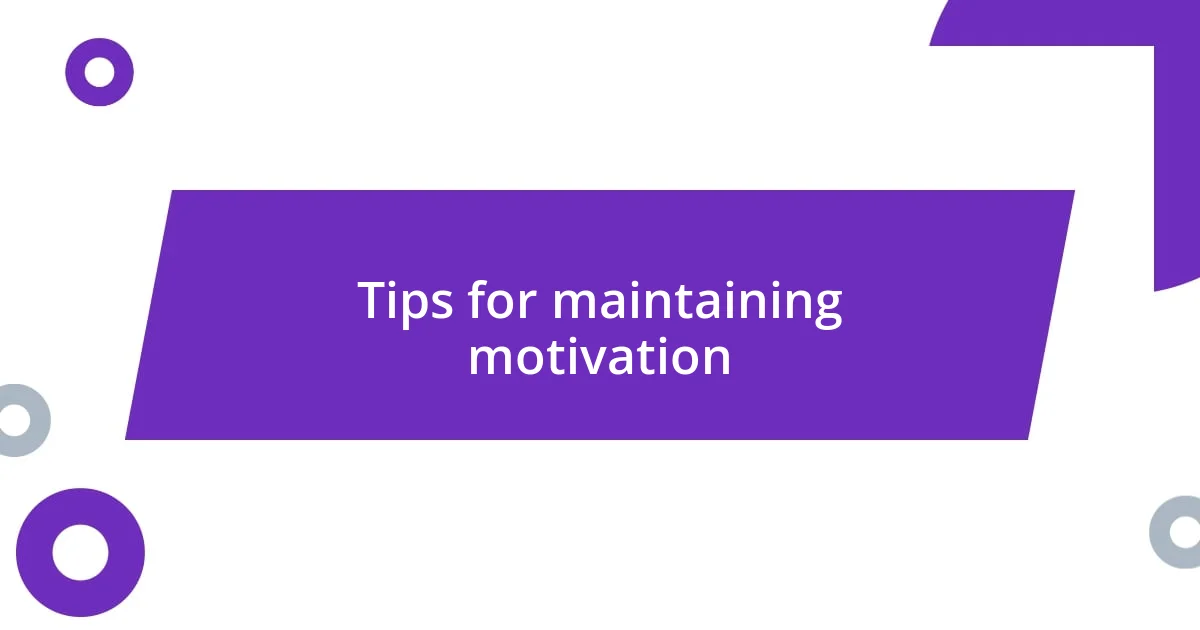
Tips for maintaining motivation
Staying motivated while dieting can sometimes feel like a daunting task. I’ve found that setting small, attainable goals makes a world of difference. For example, rather than fixating on a larger goal like losing 20 pounds, I focus on achieving weekly milestones, like trying a new recipe or incorporating a certain number of veggies into my meals. Celebrating these little wins keeps my spirits high and reminds me that progress is cumulative.
Another powerful tip is to surround yourself with support. I remember confiding in a close friend about my dieting journey, and she joined me on it. Having someone to share recipes, struggles, and successes with transformed my experience. Not only did we become each other’s cheerleaders, but we also held each other accountable, making it much easier to stay on track. Don’t you think a little camaraderie can boost motivation significantly?
Lastly, I love to visualize my success. I often take a few moments each day to imagine how I’ll feel once I achieve my goals. This mental exercise lights a spark of motivation within me. It’s not just about the number on the scale; it’s about the confidence I’ll gain and the vitality I’ll feel. Have you ever taken a moment to envision your ideal self? Engaging in this practice not only fuels my resolve but makes the journey feel more meaningful.
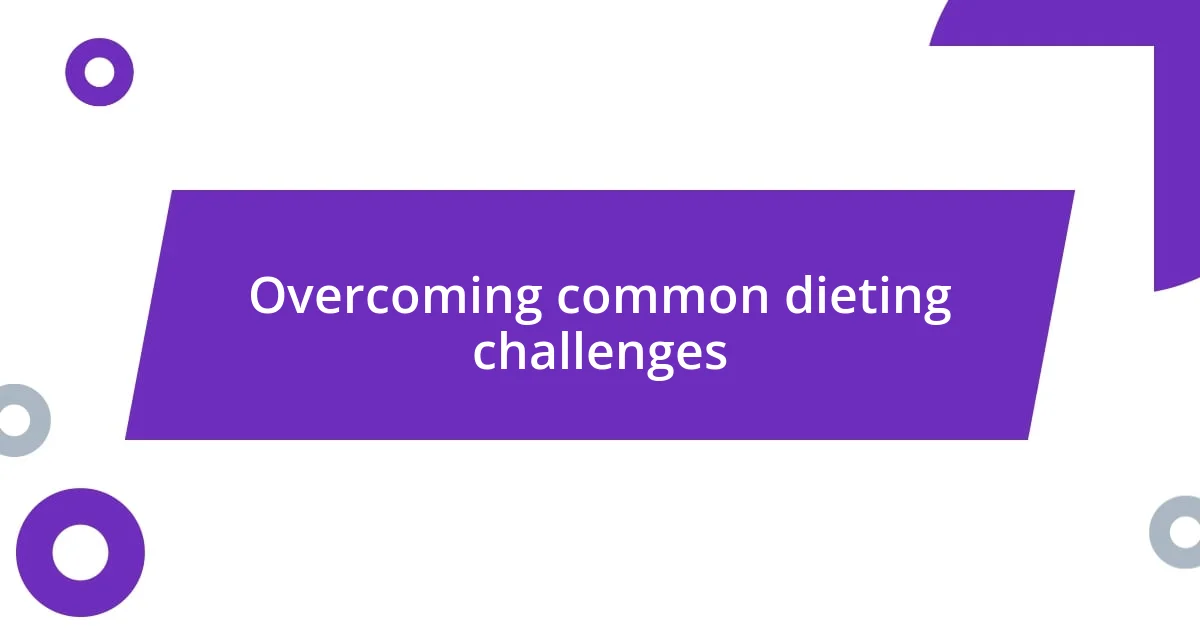
Overcoming common dieting challenges
Sometimes, I encounter moments that really test my willpower during a diet. One instance that stands out for me was a birthday party where the dessert table was practically calling my name. In that moment, instead of thinking of what I couldn’t have, I focused on what I’d gain by resisting—my healthy lifestyle goals. I’ve learned that shifting my perspective helps immensely when tempted. It’s about asking myself, “How will I feel after I indulge versus staying on track?” That little mental switch often guides my choices.
Then, there are social situations that can feel overwhelming. I remember feeling anxious about attending a dinner out with friends, fearing I’d be left without healthy options. This led me to start communicating my dietary preferences ahead of time. I’d reach out to the host or restaurant, and surprise, they were often very accommodating. It’s amazing how simply expressing my needs made a significant difference. Have you ever advocated for yourself in similar situations? I found that once I did, I felt empowered rather than deprived, which is a crucial mindset shift.
Finally, I can’t stress enough the importance of listening to my body. Early in my dieting journey, I was rigid with rules, often ignoring hunger cues. But over time, I realized that tuning in to what my body craved made balancing my diet much more sustainable. For instance, there are days when a hearty, nutritious breakfast leaves me energized, and others I might gravitate towards lighter options. It taught me to be flexible, reminding myself that dieting isn’t about strict limitations; rather, it’s about nourishing my body in ways that feel right. Isn’t it liberating to think of dieting as a journey of self-discovery rather than a series of constraints?
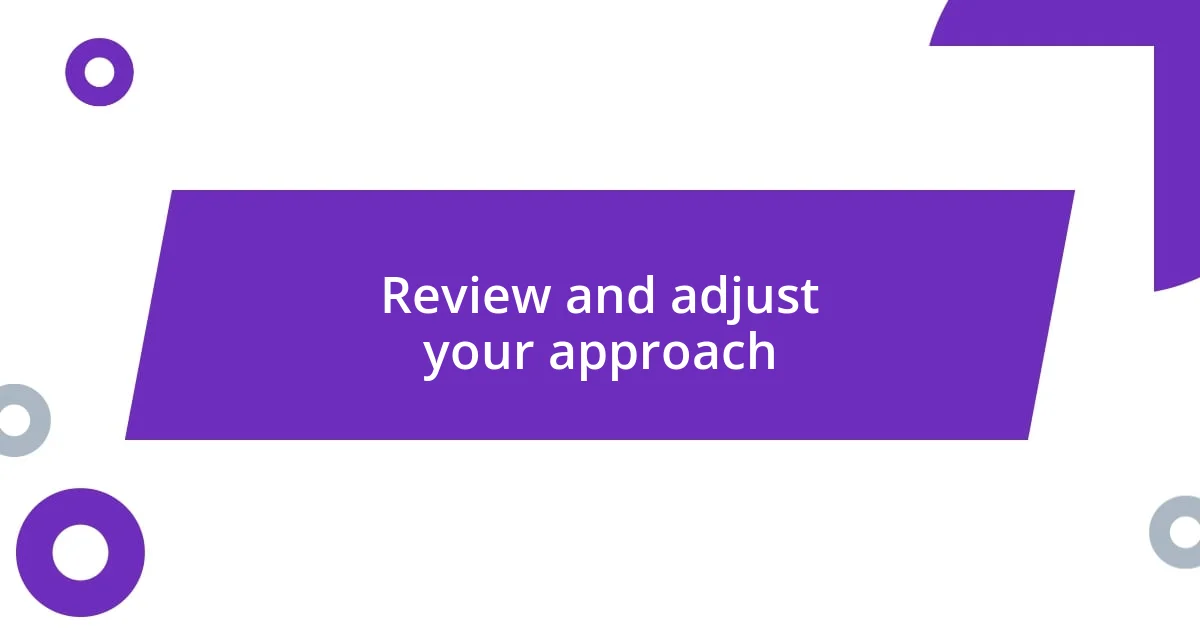
Review and adjust your approach
I often find that taking a step back to assess my dietary approach is essential. Recently, I realized my meal plan just wasn’t providing the energy I needed for my workouts. Instead of pushing through fatigue, I decided to review my meals and make adjustments, incorporating more protein-packed options. Isn’t it interesting how a simple tweak can have such a significant impact on how we feel?
After making those changes, I enjoyed noticing improvements in my overall well-being. In another instance, I tracked my food intake for a week—what a revelation that was! I discovered that certain foods, which I assumed were healthy, were leaving me feeling sluggish. This prompted me to experiment with alternatives, and now I always keep a food journal handy. Have you ever tried journaling your meals? It might surprise you how much clarity it brings.
Adjusting my approach isn’t always about what I eat; it’s also about my mindset. There have been times when I grew frustrated with slow progress, where I was tempted to give up altogether. Instead, I learned to reflect on my journey, reminding myself of the small successes along the way. Reframing my focus to appreciate those incremental changes has turned my dieting experience around. Isn’t it powerful to celebrate not just the destination, but the whole journey?














